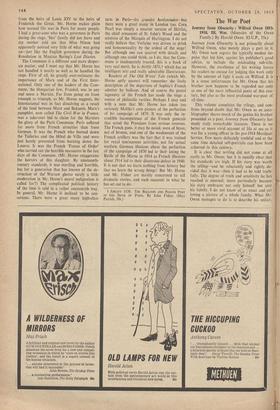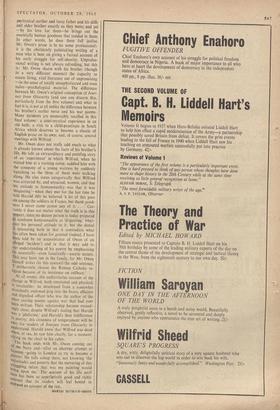The War Poet
Journey from Obscurity is not primarily about Wilfred Owen, who merely plays a part in it. Mr. Owen now regrets the typically modest im- pulse that led him, against his publisher's good advice, to include the misleading sub-title. However, the excellence of his writing leaves his readers no excuse for judging this work only by the amount of light it casts on Wilfred. It is in a sense unfortunate for Mr. Owen that his brother now happens to be regarded not only as one of the most influential poets of this cen- tury, but also as the most profound war-poet of all time.
This volume completes the trilogy, and con- firms beyond doubt that Mr. Owen as an auto- biographer shares much of the genius his brother possessed as a poet. Journey from Obscurity has many truly remarkable features. There is no better• or more vivid account of life at sea as it was for a young officer in the pre-1914 Merchant Service. Few more delicately truthful and at the same time detailed self-portraits can have been achieved in this century.
It is clear that writing did not come at all easily to Mr. Owen; but it is equally clear that his standards are high. If his story was worth the telling—and he reluctantly and rightly de- cided that it was—then it had to be told truth- fully. The degree of truth and sensitivity he has reached is unusual; more particularly because his story embraces not only himself but also his fainily. I do not know of so exact and yet loving a picture of a whole family. What M r. Owen manages to do is to describe his unfair,
puritanical mother and fussy father and his diffi- cult elder brother exactly as they were; and yet
—by his love for them—he brings out the essentially human goodness that resided in them. In other words, he does them full justice. Mr. Owen's prose is in no sense professional: it is the obstinately painstaking writing of a man who is bent on giving a factual account of his early struggle for self-identity. Unprofes- sional writing is not always refreshing, but this is: Mr. Owen shares with his brother (though in a very different manner) the capacity to create living, vital. literature out of unpromising —in the sense of totally unsophisticated and even naïve—psychological material. The difference between Mr. Owen's original conception of Jour- ney from Obscurity (and one can discern this, particularly from the first volume) and what in fact it is, is not at all unlike the'difference between his brother's earlier verse and his war poems. Many incidents are memorably, recalled in this final volume: a semi-mystical experience in an old hulk; a visit to a child-prostitute in South Africa which deserves to become a classic of English prose on its own; and, of course, several meetings with Wilfred.
Mr. Owen does not really add much to what is already known about the facts of his brother's life. He tells an extraordinary and puzzling story of an 'experiment' in which Wilfred, when he visited him at a training camp, saddled him with the company of a young waitress by suddenly vanishing as the three of them were walking along. He also states categorically that Wilfred was attracted by, and attracted, women, and that his attitude to homosexuality was that it was 'disgusting'—when they met for the last time he told Harold th5t he believed 'a lot of this goes on among the soldiers in France, but thank good-
ness I never came across any of it. . . Cer- tainly it does not matter what the truth is in this respect, since,no decent person is today prepared to condemn homosexuality as 'disgusting,' what- ever his personal attitude to it; but the denial is interesting both in that it contradicts what has often been taken for granted (indeed, I have been told by an acquaintance of Owen of an alleged 'incident') and in that it may add to our understanding of his poetry by emphasising his essentially—even fanatically—ascetic nature. This may have run in the family, for Mr. Owen himself writes (in this context) the odd sentence, 1 deliberately choose the Roman Catholic re- ligion because of its insistence on celibacy.'
At all events, this authoritative account of the change in Wilfred, both emotional and physical, is invaluable: he developed from a somewhat wretchedly endowed prig into the brave, efficient and. dignified officer who was the author of the most searing poems against war that had ever been written. Their relationship became exceed- ingly close, despite Wilfred's feeling that Harold was a 'philistine,' and Harold's then indifference to poetry; this closeness of temperament will be easy for readers of Journey from Obscurity to understand. Harold knew that Wilfred was dead When, at sea, he saw him clearly, for a moment, Sitting on the chair in his cabin.
The book ends with Mr. Owen coming out Of the Navy and—after an abortive attempt at arming--going to London to try tv become a Painter. He falls asleep there, not knowing 'the vicissitudes and poverty that the nurturing of this struggling infant that was my painting would ,g upon me.' The account of his life until 'fie has been so superlatively good and richly unusual that its .readers will feel bound to demand an account of the rest.
MARTIN SEYMOUR-SMITH







































 Previous page
Previous page